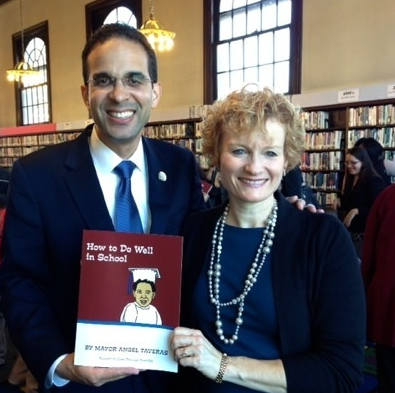CCRI Faculty: Potential for “Hostile Takeover” in Performance Based Funding
Wednesday, March 11, 2015
CCRI faculty are questioning the oversight capabilities of the new Commissioner of Higher Education in the state, following legislation introduced in the General Assembly to establish a performance-based funding component to state aid for Rhode Island’s institutions of higher learning.
Senate President M. Teresa Paiva Weed and Representative Joseph McNamara have introduced bills (S-0603 and H-5077) to make all new state higher education funding contingent upon achievement of certain goals, such as improved on-time graduation rates, and increasing completion of programs in high-demand fields.
"An underlying concern is that there is a fundamental difference of perspective between faculty who see our mission as serving the people of Rhode Island in general and the students who seek us out for an education in particular, and those who see our mission as serving the State of Rhode Island and its government," said CCRI Faculty Association President Shawn Parker. "Truthfully it is both and has always involved a careful balance."
GET THE LATEST BREAKING NEWS HERE -- SIGN UP FOR GOLOCAL FREE DAILY EBLASTParker, who released a video message to all faculty about the legislation last week, said that it was the Senate version in particular that caused him concern.
"My biggest concern with the Senate bill is far more worrying. It puts unprecedented power in the hands of one unelected official without checks and balances," said Parker.
Needs Assessment
In a release sent by the General Assembly press office on March 6, Senate President Paiva Weed explained her support for the measure.
“Among first time students taking classes at CCRI, only one in 30 will complete an associate’s degree program within two years, and only one in ten will earn a degree in three years,” said Paiva Weed “Our community college needs to be the central driver of workforce development in Rhode Island. Otherwise, the only options left to students will be more expensive private schools and out-of-state institutions. This legislation will help fuel efforts to reinvent CCRI as a workforce development engine.”
The legislation directs the Commissioner of Postsecondary Education to implement performance-based funding for Rhode Island’s higher education institutions beginning in Fiscal Year 2018. After that, any new state funding allocations greater than the base amount allocated in Fiscal Year 2016 would be tied to success achieving certain goals, which include the number of and growth in degrees earned within an expected time frame, for full-time students, or the reaching of incremental milestones towards degree completion, for part-time students.
"The proposal would give the Commissioner of Post-Secondary Education a role that was in no way included in the legislation that established that office last year," said Parker, citing the following portion of the legislation.
16-105-2. Public postsecondary performance-based funding. -- The commissioner of postsecondary education is hereby directed to implement a performance-based funding formula that meets the requirements of this chapter, in consultation with the council on postsecondary education.
"If a school meets the metrics targets set by the commissioner, the commissioner will revise them to further advance the goals," said Parker. "So it is a moving target and the commissioner has the power to move it. Should one of the schools not meet its metrics target:
16-105-5. Performance not achieved. -- If an institution has failed to meet any of the performance metrics set forth in this chapter or as defined by the commissioner of postsecondary education, the associated funds shall be distributed to the institution for corrective action and oversight by the office of the postsecondary commissioner.
"This appears to take a portion of a school’s budget and put it under the control of the commissioner for undefined “corrective action and oversight.” I am not aware that any other individual in Rhode Island has had such a power to control a portion of a state college’s budget without the approval of the Board of Education or Council for Post-Secondary Education or within a shared governance structure at the state institutions. And that is my principal concern with the Senate bill," said Parker. "We were told that if we did not meet these moving targets, the state could essentially engage in a 'hostile takeover' of CCRI."
CCRI Faculty Addressing Situation
"I attended the November 19 Council for Post-Secondary Education meeting and spoke to the Council specifically about the exclusion of faculty and students as stakeholders and contributors to the commissioner’s plan and ongoing process," said Parker. "The commissioner and the CPSE verbally committed to including the faculty and said that he had always assumed the faculty are key stakeholders and would be part of the process. Those assurances were not noted in the minutes or incorporated into the strategic plan, but are recorded in the video of the session. I’m not aware that faculty have been involved in any process with the commissioner’s efforts."
Parker offered his suggestions as to how both CCRI faculty and the state could move forward together.
"I would welcome and encourage a needs assessment from the perspective of students and faculty. Faculty often advocate on behalf of students since we work so closely with them, and we would have much to contribute to a study, but a good study of the students and their needs and how well the college is responding would probably give us a clear picture of how we are doing," said Parker. "But if the idea is serving the State vs. serving the people, I don’t have much hope that the right studies will be done nor the right changes be put into place. Complete College America had done a masterful job of packaging slick one-size-fits-all game-changing solutions that have indeed changed the game across the country."
.
Related Slideshow: Who Could Be RI’s Next Education Commissioner?
Related Articles
- Unknown and unappreciated? CCRI’s quest for the “big time”
- CCRI Hoops Makes Rhode Island Proud
- CCRI baseball headed to NJCAA World Series
- CCRI’s Williams A High D-1 Talent?
- NEW: College Affordability Panel Schedules Public Hearings at RIC, CCRI, URI
- NEW: Governor Chafee To Announce CCRI Energy Utility Program
- Orientation for CCRI’s Comprehensive Pharmacy Tech Program
- CCRI President Spends Tens of Thousands on Private Club, Pool
- CCRI’s Williams, Yarce Honored
- NEW: CCRI Promotes Brittany Brown To Head Women’s Basketball
- PODCAST: CCRI Pres. Spends Tens of Thousands on Private Club, Pool
- CCRI President Paid Over $100K More than Average Comm. College
- CCRI Faculty: Potential for “Hostile Takeover” in Performance Based Funding
- CCRI Culinary Arts Program Now For Credit
- NEW: CCRI to Receive More than $475,000 in Federal Funding
- Report: Overwhelming Majority of CCRI Students Not ‘College Ready’
- Education Experts Raise Questions About CCRI Spending
- Students React to CCRI President’s $370,000 in Salary, Perks
- In Case You Missed It: CCRI President’s Spending Spree
- CCRI, PC to Announce Transfer Agreement
- CCRI’s Hopkins to be Honored With Words Unlimited Lifetime Achievement Award
- PODCAST: Education Experts Raise Questions About CCRI Spending
- NEW: CCRI Honors Six Distinguished Graduates

















